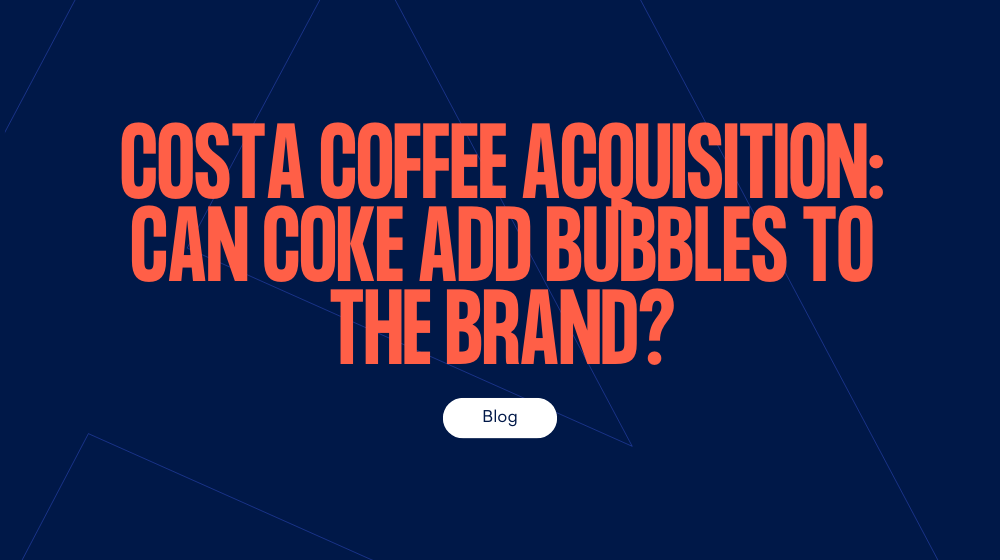The news of Coca-Cola’s impending acquisition of Costa Coffee caught my eye, not only because both brands feature often in my sleep deprived life with two young boys. Interestingly, the deal has also raised different opinions in the office worthy of a few thoughts.
I’ve had a number of recent conversations about ‘brand association’, with clients asking questions like ‘how do we best transition brands after an acquisition?’, ‘should we co-brand our exhibition space?’ and ‘do we want to be seen on a speaking panel with these brands?’
Both the Costa deal and the subsequent, seemingly imminent purchase of GlaxoSmithKline’s Horlicks business in India are aimed at broadening Coke’s portfolio. They’re not branding acquisitions; but they do have branding implications.
The strategy
In the case of Costa, the reasoning behind Coca-Cola’s move is clear. It has no coffee in its portfolio – and coffee is big business. Coke can leverage its huge existing distribution network to grow Costa sales and use the coffee chain’s network of outlets to boost sales of its soft drinks.
Alison Brittain, Chief Executive of Whitbread (which currently owns Costa) also points out that Coke is well placed to extend Costa’s reach into new markets, such as "ready to drink, cold brew coffees". "You could see Costa absolutely everywhere, in vending machines, hotels, restaurants, pubs, cafes - in all the places you see Coke today," explains Brittain.
The opportunity is such that those in the know at the Motley Fool suggest that Costa could realistically become the number two brand in the US, albeit with time. It currently has around 3,500 outlets worldwide compared to Starbucks’ market-leading 27,000+. “Costa has proven it can be a name, but it's going to take a while in the US until it is a name,” says Fool contributor Daniel Kline.
Costa’s number of outlets may be dwarfed by that of Starbucks, but it’s still enough to make it the fifth biggest coffee company in the world. Look at social proof over scale, though, and the picture isn’t so pretty. Both TrustPilot and YouGov make for pretty underwhelming reading where people’s opinions of Costa are concerned. The acquisition is a chance to change that – and Coca-Cola will no doubt intend to.
The branding
For Coke, of course, the purchase of – and association with – the Costa brand will do little to impact its own ubiquitous brand, other than the result of diversifying slightly away from sugary drinks. For Costa, the impact will be much bigger. A homegrown UK brand being bought out (to any extent) by a US behemoth doesn’t necessarily play well in some quarters – just ask Innocent.
Costa is no Innocent, though. Its hasn’t been positioned in the same cutesy, ethical way and it’s not viewed as affectionately as Innocent was when it received investment from Coke. What’s more, any fall-out from the acquisition is likely to only be temporary. As the brand is grown under Coca-Cola’s stewardship, it will reach new markets for which Coke has always been the owner.
The question, as Creative Orchestra’s Chris Arnold says, is: “What positive brand values does Coke bring to Joe Public?” His answer is none and I’m largely inclined to agree with that – Coke isn’t typically one for injecting its own brand into those of its acquisitions. But I don’t see much negative for Costa either. Public sentiment about its brand is hardly flying. More likely, we’ll see brand perception gradually improve over time as it matures and develops with Coca-Cola’s strategic and financial clout behind it.
Despite the low risk that this acquisition poses to Costa’s brand, it shouldn’t be taken as rote where other deals are concerned. Brands need to think carefully about who they are seen to be aligned with and how it will play with their customers and target markets. As brands scale, the right associations can boost credibility, especially when entering new markets – that’s one thing Costa will find. Conversely, the wrong associations can not only damage reputation, but growth and bottom line too.



